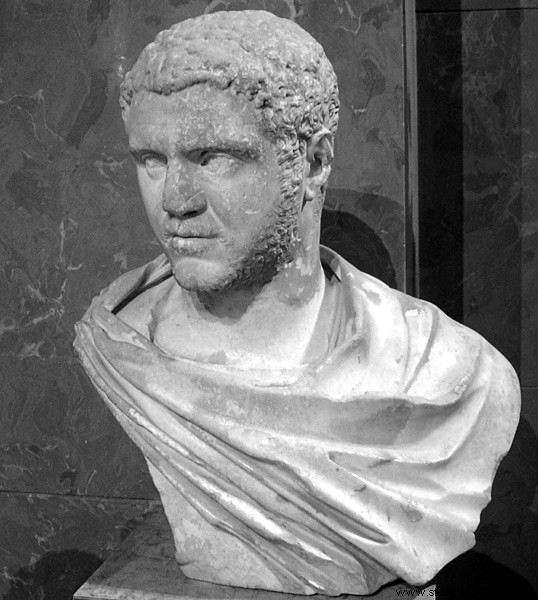If the right to Roman citizenship was very restricted, in addition to transmission by heredity, with time and the expansion of the Empire, other colonized peoples were able to access it. Thus, in 48, the Emperor Claudius, himself born outside Rome, granted citizenship to the so-called hairy Gaul and offered them access to the magistracy. This policy of openness will be continued by Vespasian then Marc Aurèle (Table of Banasa, 169-177).
212

Characters
Caracalla
Procedure
If citizenship is hereditary, it can also sometimes be purchased (with transmission included), or obtained after twenty-five years of good and loyal service in the auxiliary troops of the imperial army.
The Emperor Caracalla (188-217), son of Septimius Severus, was himself born in Lyon, and not in Rome; he therefore had another vision of the Roman Empire over which he reigned between 211 and 217. Thus, the year following his arrival in power, he promulgated an edict which offered citizenship to all the free inhabitants of the Empire. Only “deditices” (i.e. barbarians subjugated by force) and slaves are not included.
The reasons of Caracalla are poorly known because there is no text concerning the edict precisely. The emperor is suspected of having had a fiscal motive in order to increase the imperial revenue. Indeed, citizens' tax goes to the city in which they live and not to the imperial treasury if they do not have Roman nationality.
There may also have been administrative motivations. Indeed, the statutes being so diverse and varied within the Empire, a simplification must have been beneficial to manage the Empire.
In addition, the emperor, who wishes to federate his people, increases their number in order to increase his power. Finally, to be a Roman citizen is an honor; therefore, to grant this citizenship to other peoples is to offer them this dignity as well as the advantages that accompany it.
Consequences
- One of the attractions of serving in the army troops was the access to Roman citizenship. The promulgation of this edict caused real difficulties in recruiting into the army which, at that time, was no longer an army of conquest but of defense, much less exciting.
- Christian wanderers become Roman citizens, but because they refuse to serve the gods of the Empire, they will be persecuted.
- This edict is a factor of division since it divides the people into two distinct classes:the honestiores , the ruling class that has citizenship since the Republic, and the humiliores , the humble.
- If this edict was welcomed with joy by the annexed peoples, the fact remains that the emperor's goal remains a fiscal motivation. Nevertheless, this text made it possible to unify the Empire and increase its power.
